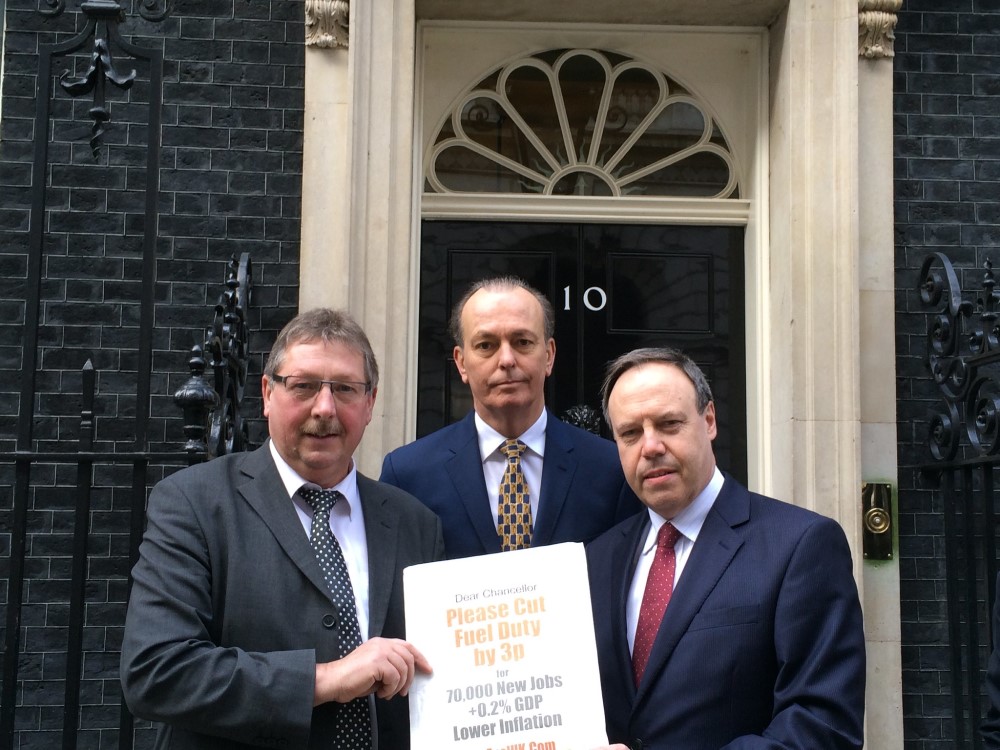Rumours began swirling in February that the upcoming budget could bring the UK’s 10-year freeze on fuel duty to an end. Since then, an industry-funded pressure group has been furiously campaigning for the new Chancellor, Rishi Sunak, to abandon the planned change.
FairFuel claims to enjoy the support of 146 MPs and 1.7 million British drivers but has been accused by campaigners of having “no credible solutions” to the twin problems of localised air pollution and climate change.
The Kent-based campaign opposes low emission zones in cities, which it says are based on “flawed health data”, and criticises the “perennial demonisation of van drivers, hauliers and motorists” on its website.
Fronting the effort are former Top Gear presenter Quentin Willson and political lobbyist Howard Cox, who recently tweeted that the BBC was “worshipping at the altar of Greta Thunberg” and that the public needed to “hear both sides of the climate change argument”.
Despite urging its supporters to vote Conservative at the general election, with warnings that a Corbyn victory would usher in a “pathologically anti-motorist political era”, FairFuel has gone into all-out attack mode in recent weeks.
Feverish lobbying
FairFuel declares it has saved drivers £100 billion in taxes since 2011, when George Osborne introduced a fuel duty freeze that has been in place ever since.
But that could be about to change, as the government looks for ways to bolster its green credentials ahead of the COP26 climate summit in Glasgow, while raising more revenue for its big infrastructure investment plans.
Can you help support DeSmog’s work? Become a patron today!
The group has teamed up with the longstanding “Keep it Down” campaign run by The Sun, which is publishing daily articles on the damage it says a 2p per litre fuel duty increase would do to the Tories’ new support base in so-called “Red Wall” seats.
Two weeks ago, it claimed credit for pressuring the government into shelving the plans, after The Times reported that the policy was being dropped, though the group had admitted fuel duty could go up in the coming years and they would “need to start lobbying again”.
With the fuel duty “unfreeze” now seemingly back on the table for Wednesday’s budget, however, FairFuel released a poll at the end of last week claiming almost half of drivers who voted for Boris Johnson in December would abandon the party at the next election if the government increased fuel duty.
Meanwhile, 36 Tory MPs, including former Transport Secretary Chris Grayling, former Brexit Secretary David Davis and former Work and Pensions Secretary Iain Duncan Smith, have written to the Chancellor warning him against raising fuel duty by 2p per litre, according to the Telegraph. The Sun reported last week that 53 MPs had signed the letter.
The MPs argue that green measures should not be put “on the backs of working people” and that the government should not be not “whacking normal folk hard with higher taxes on fuel”.
That’s not a view shared by the Green Party, whose finance spokesperson Molly Scott Cato said: “When the impacts of the climate crisis can be seen all around us, it clearly makes no sense to keep tax incentives which encourage the burning of more fossil fuels.”
She said the extra revenue should be spent on a “public transport revolution, providing reliable and affordable bus and rail services across the UK.”
Industry-backed
While FairFuel’s message may be clear, how the group financially supports itself is less well known.
It does not publicly disclose the levels of funding received from different sources and did not respond to questions from DeSmog.
FairFuel is, however, open about who its “founding backers” are on its website: the Freight Transport Association and the Road Haulage Association, both of which represent road transport companies.
Previous funders also include the automotive services company RAC, the trade association for liquefied petroleum gas and biopropane renewable gas companies Liquid Gas UK, and the Association of Pallet Networks, a haulage industry group which still supports FairFuel, according to its website.
Both the FTA and RHA have been actively lobbying against the introduction of Clean Air Zones in key cities, designed to tackle illegal levels of air pollution as part of a nationwide government strategy.
Chris Yarsley, policy manager for the Midlands at the FTA, welcomed the news last week that Coventry would no longer be required to implement a CAZ, arguing that other measures like cycle infrastructure investment would “deliver quicker, more sustainable improvements to air quality without penalising hard-working local businesses”.
The RHA said plans for a “punitive” and “anti-business” CAZ in Manchester could lead to hauliers “going bust”.
But Jonathan Ritson, Policy Analyst at the Green Alliance, told DeSmog that London’s Toxicity Charge and subsequent Ultra Low Emission Zone were the only schemes that had “radically reduced NOx concentrations at the city level”. He said the policies, which the latest figures suggest have reduced the number of illegal NOx concentrations by 97 percent, had “proved to be the only effective way of changing the behaviour of businesses and individuals”.
“As more cities adopt clean air zones to meet their legally binding air quality targets, a number of scrappage and retrofitting schemes are being made available to help businesses adapt,” he said, recommending that businesses seek out support from their local authorities.
Parliamentary support
FairFuel has a number of close allies in the House of Commons.
Harlow MP Robert Halfon is the group’s most vocal advocate, having co-organised a petition in 2011 calling for a planned fuel duty increase to be scrapped and the creation of a commission to explore “radical ways of cutting fuel taxes in the longer term”.
Halfon is one of a number of Conservative MPs to have recently taken donations from hedge fund manager Sir Michael Hintze, and has previously received financial support from the businessman Edward Atkin. Both are donors to the climate science denying Global Warming Policy Foundation, whose widely criticised reports have been publicised by FairFuel on a number of occasions.
Other MPs that have spoken out in support of the campaign include Conservatives Jack Lopresti and Peter Aldous, and DUP MP Sammy Wilson, who has described climate change as a “gigantic con”.
Up until the general election, the group administered an “all-party parliamentary group”, which brought together MPs to support its campaigns.
The APPG on Fair Fuel for Motorists and Hauliers, which dates back to at least 2015, was chaired by Scottish Conservative MP Douglas Ross and included Tory MPs Kirstene Hair and Julian Knight, Labour MPs Mary Glindon and Rosie Cooper, SNP MPs Martyn Day and Angus MacNeil, and DUP MP Ian Paisley Jr, according to official records.
Downplaying concerns
As calls for stronger clean air measures have grown in recent years, FairFuel has increasingly sought to dismiss what it describes as “emotive and dubious air quality claims”.
Spokesman Quentin Willson has claimed air pollution is responsible for a premature loss of life of only half a day a year, while a recent study estimated air pollution was shortening life expectancy by an average of three years globally, and one and a half in the UK.
Willson has also written that private car drivers are being unfairly targeted in London, calling them a “relatively narrow band of polluters at 11 percent of NOx [nitrogen oxides]”, when official figures show roughly half of polluting emissions in London are caused by road transport.
Its website states that “97.8 percent of drivers firmly believe political decision makers prefer to take the easy option by fleecing extra cash from hard-working drivers, families, small businesses and hauliers” but did not clarify where this figure had come from when contacted by DeSmog.
Rather than implementing low emission zones like London’s ULEZ, which FairFuel says are unnecessary, the group’s only proposed solutions are “catalysts”, to be added to motor fuel.
Greg Archer, UK Director of the Transport & Environment NGO, likened these to “alchemists trying to turn lead into gold”. He said FairFuel has “no credible solutions to the UK’s toxic air or climate emergency. The fuel duty freeze has added the equivalent of 2.5 million cars to the UK’s roads. It’s time for motorists to start paying their way again after a 10 year tax break.”
When approached for comment, the Treasury said it could not comment on “budget speculation”. FairFuel did not respond to a request to comment.
Photo credit: DUP Photos/Flickr/CC BY–NC–ND 2.0
Subscribe to our newsletter
Stay up to date with DeSmog news and alerts






